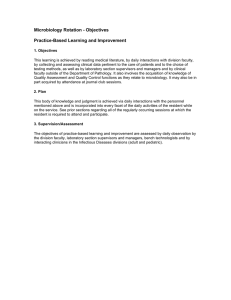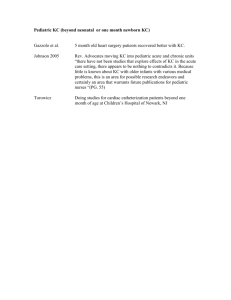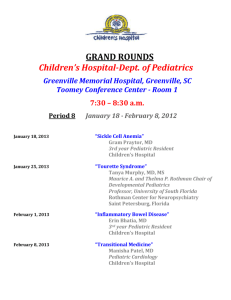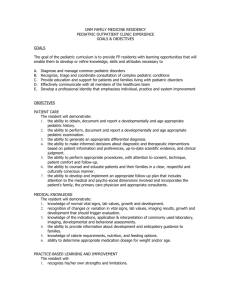Louisiana State University – Health Sciences Center Pediatric Hospital Medicine Elective
advertisement
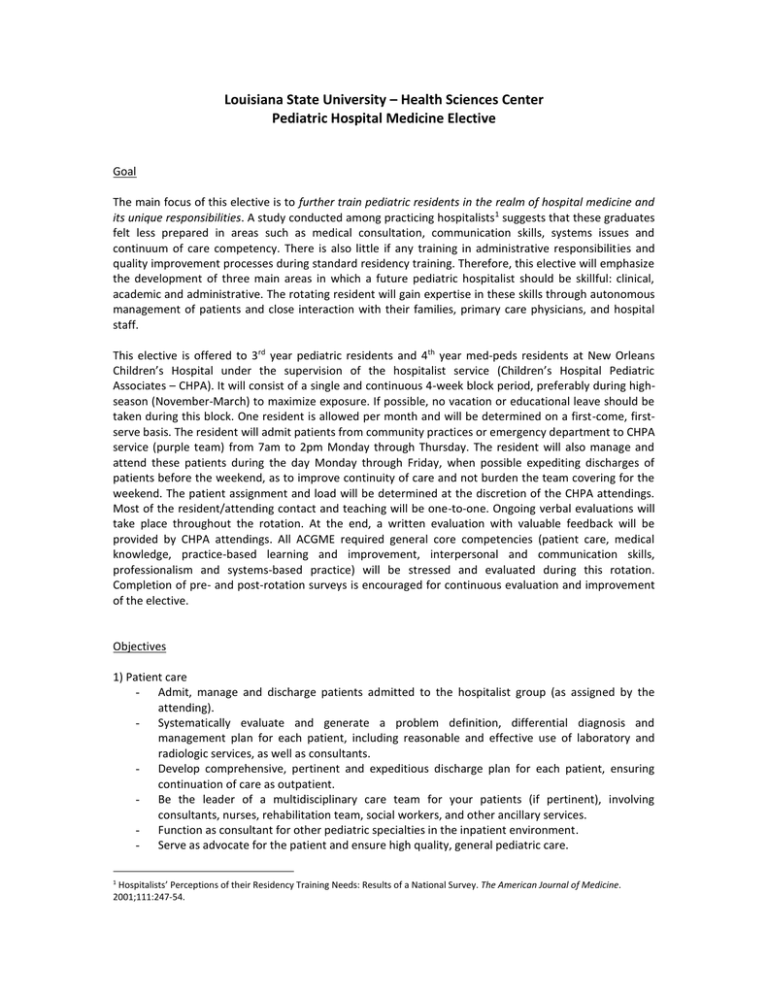
Louisiana State University – Health Sciences Center Pediatric Hospital Medicine Elective Goal The main focus of this elective is to further train pediatric residents in the realm of hospital medicine and its unique responsibilities. A study conducted among practicing hospitalists1 suggests that these graduates felt less prepared in areas such as medical consultation, communication skills, systems issues and continuum of care competency. There is also little if any training in administrative responsibilities and quality improvement processes during standard residency training. Therefore, this elective will emphasize the development of three main areas in which a future pediatric hospitalist should be skillful: clinical, academic and administrative. The rotating resident will gain expertise in these skills through autonomous management of patients and close interaction with their families, primary care physicians, and hospital staff. This elective is offered to 3rd year pediatric residents and 4th year med-peds residents at New Orleans Children’s Hospital under the supervision of the hospitalist service (Children’s Hospital Pediatric Associates – CHPA). It will consist of a single and continuous 4-week block period, preferably during highseason (November-March) to maximize exposure. If possible, no vacation or educational leave should be taken during this block. One resident is allowed per month and will be determined on a first-come, firstserve basis. The resident will admit patients from community practices or emergency department to CHPA service (purple team) from 7am to 2pm Monday through Thursday. The resident will also manage and attend these patients during the day Monday through Friday, when possible expediting discharges of patients before the weekend, as to improve continuity of care and not burden the team covering for the weekend. The patient assignment and load will be determined at the discretion of the CHPA attendings. Most of the resident/attending contact and teaching will be one-to-one. Ongoing verbal evaluations will take place throughout the rotation. At the end, a written evaluation with valuable feedback will be provided by CHPA attendings. All ACGME required general core competencies (patient care, medical knowledge, practice-based learning and improvement, interpersonal and communication skills, professionalism and systems-based practice) will be stressed and evaluated during this rotation. Completion of pre- and post-rotation surveys is encouraged for continuous evaluation and improvement of the elective. Objectives 1) Patient care - Admit, manage and discharge patients admitted to the hospitalist group (as assigned by the attending). - Systematically evaluate and generate a problem definition, differential diagnosis and management plan for each patient, including reasonable and effective use of laboratory and radiologic services, as well as consultants. - Develop comprehensive, pertinent and expeditious discharge plan for each patient, ensuring continuation of care as outpatient. - Be the leader of a multidisciplinary care team for your patients (if pertinent), involving consultants, nurses, rehabilitation team, social workers, and other ancillary services. - Function as consultant for other pediatric specialties in the inpatient environment. - Serve as advocate for the patient and ensure high quality, general pediatric care. 1 Hospitalists’ Perceptions of their Residency Training Needs: Results of a National Survey. The American Journal of Medicine. 2001;111:247-54. - Provide appropriate continuity of care by detailed sign-outs to the Purple Team. 2) Medical knowledge - Understand and become knowledgeable on the most common inpatient pediatric problems, including but not limited to: asthma, bronchiolitis, croup, pneumonia, gastroenteritis and dehydration, urinary tract infection, fever without a source in infants under 3 months, seizures, ALTE, cellulitis and other soft tissue infections, adenitis and retropharyngeal infections, and child abuse. Use practice-based guidelines in diagnostic and management procedures to systematically approach these conditions. - Attend and participate in morning report. 3) Practice-based learning and improvement - Using information technology to locate and utilize available evidence to maximize diagnostic and therapeutic effectiveness. - Use the “educational prescription” as a guide to formulate clinical questions pertinent to your patient and investigate available evidence. - Be aware of potential quality improvement issues regarding hospital-based therapy pertinent to our specific clinical practice and patient population. Consider ideas/methods to improve these areas. 4) Interpersonal and communication skills - Develop effective communication skills by discussing plan of care with the patient and family in a timely fashion, demonstrating compassion and empathy. Promote respectful interdisciplinary interactions among colleagues, ancillary and non-medical services. - Understand the importance of maintaining clear, opportune and reciprocal hospital interfaces (communication with outpatient settings). 5) Professionalism - Take ownership of patients and perform clinical care with respect, compassion and integrity. - Know your limitations. - Serve as educator and advocate for patients and their families, exercising cultural sensitivity and social awareness. 6) Systems-based practice - Gain experience in the management and coordination of care of chronically ill children with complex medical needs. - Be aware of and properly utilize available community, state and/or federal resources and other material (systems-based practice) useful for patient care, counseling and education. - Learn the basics of coding and billing for inpatient practice, using the International Statistical Classification of Diseases and Related Health Problems (ICD-9 coding). - Understand healthcare economics and hospital organization by participating in administrative meetings and/or committees which impact hospital care. Pediatric Hospital Medicine Elective Resident Evaluation Form Yes 1. Patient care: Recognizes the importance of timely admission and discharge, effective and compassionate communication with families, and prompt follow-up with referring physicians. Develops a rationale for the use of consultants, social workers and rehabilitation services and recognizes the importance of establishing and coordinating a multidisciplinary approach to children with chronic illnesses. 2. Medical knowledge: Demonstrates understanding of common pediatric in-patient conditions, as well as efficient management. Is able to generate a problem definition, differential diagnosis and management plan. 3. Practice-based learning and improvement: Uses systematic and evidenced-based practices to care for common pediatric inpatient problems. 4. Interpersonal and communication skills: Communicates respectfully and effectively with patients, families and medical team. Understands the importance of developing personal coping mechanisms for managing stresses associated with caring for acutely and chronically ill children on a daily basis. 5. Professionalism: Demonstrates professional behavior and sensitivity towards patients, families and medical team. 6. Systems-based practice: Is aware of and utilizes community resources responsibly and effectively. No N/A
